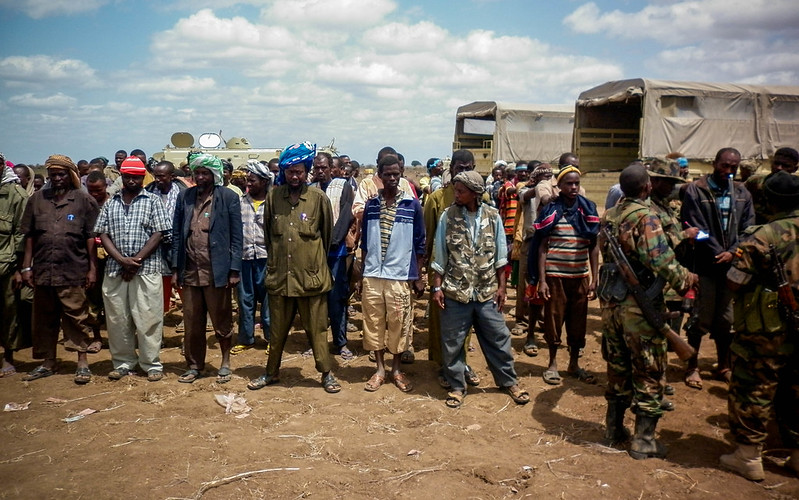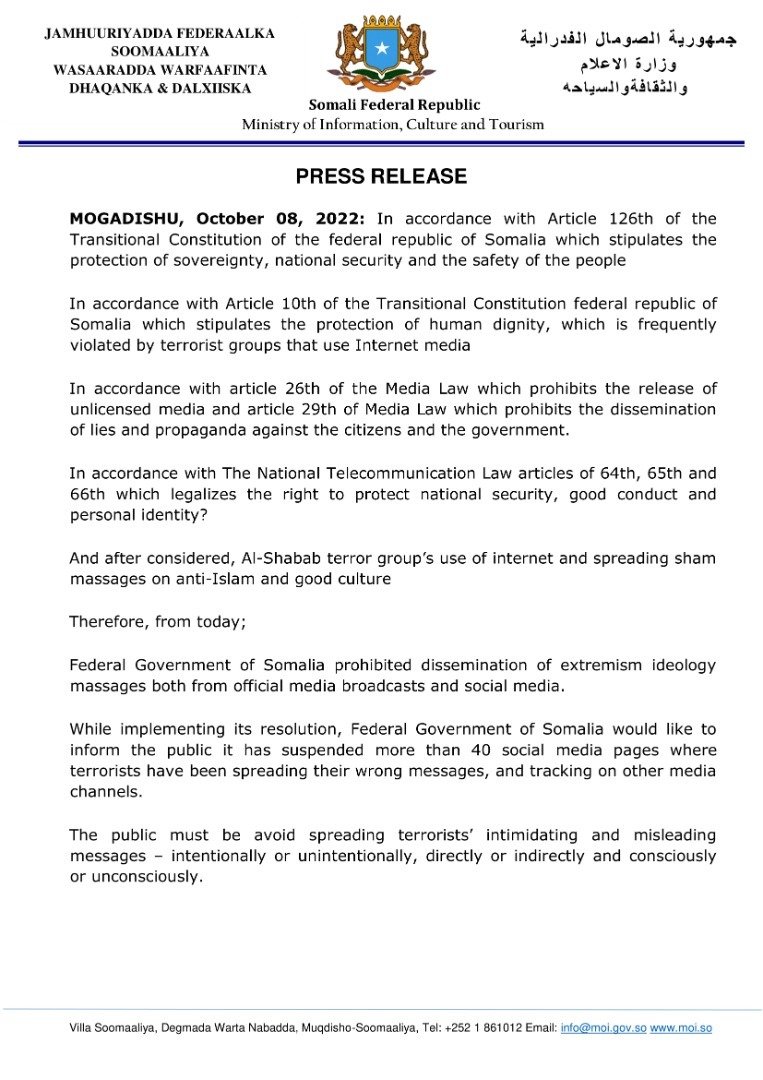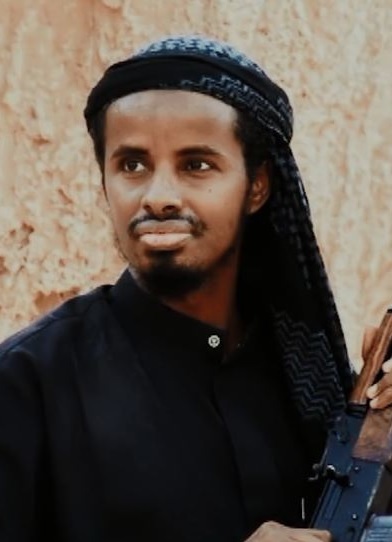
Members of the Al Qaeda-affiliated militant group Al-Shabaab stand after giving themselves up to forces of the African Union Mission in Somalia (AMISOM) in September 2012.
“The army and their allied locals captured the strategic Indian Ocean city of Harardhere, which has been Al-Shabaab’s nerve economic and command center for years.”
Nearly seven months into what Somalia has called a “total war” against the group, the Somali National Army (SNA) has consistently wrested territory away from al-Qaeda’s East African branch, al-Shabaab. Somalia recently claimed that its gains against al-Shabaab have led the terrorist organization to seek, for the first time ever, to negotiate with the government. As articulated in the first article from Shabelle Media, the recent government successes are a result of assistance from the United States, Somali clan militias, increased citizen support, and more draconian measures from the government itself.[i] In January, the SNA captured the port town of Harardhere, an important al-Shabaab economic hub. In the second article from Garowe Online, the Deputy Defense Minister of Somalia, Abdifatah Kasim, proclaimed that al-Shabaab has suggested the idea of negotiations; however, Al-Shabaab members have denied that the group as a whole forwarded such an offer..
Taken together, the above stories are noteworthy in that they potentially signal a rare turning of the tide against al-Shabaab. Indeed, for years the war against Al-Shabab has been at a stalemate despite significant international assistance. Sustained progress might be made if the current gains can be capitalized upon by Somalia and the international community. However, al-Shabaab and al-Qaeda have historically proven to be resilient and the recent gains in no way portends the group’s defeat.
Sources:
“Somali troops dislodge third town from Al-Shabaab in two days,” Shabelle Media (independent Somali/English language news center), 17 January 2023. https://shabellemedia.com/somali-troops-dislodge-third-town-from-al-shabaab-in-two-days/
The war against Al-Shabaab is raging on at a speed time as the Somalia National Army (SNA) and vigilantes take over three towns within two days, a victory that will live long. The minister of defense Abdulakadir Mohamed Nur ticked with a green pen the seizure of the El-Dhere in Galgadud from Al-Shabaab peacefully as the militants fled from their bases.
El-Dher joined dozens of liberated areas in southern and central regions of Somalia during the current all-out offensive assisted by US military and local clan fighters.
On Monday, the army and their allied locals captured the strategic Indian Ocean city of Harardhere, which has been Al-Shabaab’s nerve economic and command center for years.
The latest gains came at no cost of lives as Al-Shabaab leaves every district without posing resistance to the SNA assault. The Al-Qaeda-linked militants carried out ambush attacks against military bases in Hiran and Middle Shabelle regions, where the group faced big losses on the battlefields. The government of Somalia has pledged to liberate the whole country from Al-Shabaab in this year with the support of foreign partners and local communities who joined the war.
“Al-Shabaab extremists deny contact with Somalia’s government,” AfricaNews (pan-African news aggregator), 9 January 2023.
https://www.africanews.com/2023/01/09/al-shabab-extremists-deny-contact-with-somalias-government/
The Somalia-based al-Shabab extremist group has denied having contact with the Somali government after the country’s deputy defense minister claimed that the extremists had for the first time asked to negotiate.
An unnamed al-Shabab official with the group’s media unit told a pro-al-Shabab website in comments published Sunday that “there is no talk between us.”
On Saturday, Deputy Defense Minister Abdifatah Kasim told journalists in Mogadishu that “al-Shabab requested to open negotiations with the Somali government, but there are two groups within al-Shabab.”…
It was the first time Somalia’s federal government had claimed the extremist group had requested talks.
The comments came amid a military offensive the government launched last year and has described as “total war.” Al-Shabab is an al-Qaida-affiliate that for well over a decade has carried out high-profile bombings in Somalia’s capital and controlled parts of the country’s central and southern regions, complicating efforts to rebuild the once-failed state after decades of conflict.
Al-Shabab numbers several thousand fighters, including an unknown number of foreigners, both from regional countries like neighboring Kenya and beyond.
Notes:
[i] For instance, the government of Somalia recently outlawed the reporting about al-Shabaab by media outlets. For more, see: Jason Warner, “Somalia Government Bans Media Reporting on Al-Shabaab,” OE Watch #11, 2022. https://community.apan.org/wg/tradoc-g2/fmso/m/oe-watch-articles-2-singular-format/429366
Image Information:
Image: Members of the Al Qaeda-affiliated militant group Al-Shabaab stand after giving themselves up to forces of the African Union Mission in Somalia (AMISOM) in September 2012
Source: https://www.flickr.com/photos/au_unistphotostream/8019360014
Attribution: Public Domain (CCO)


